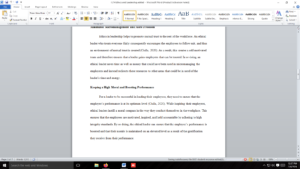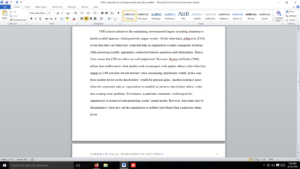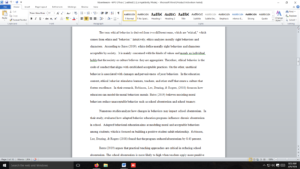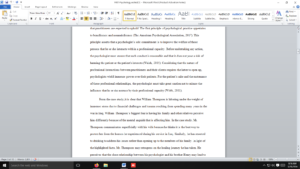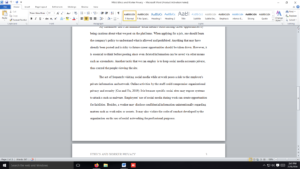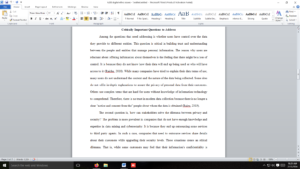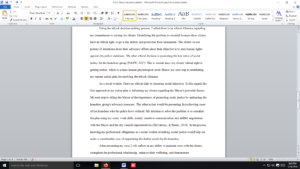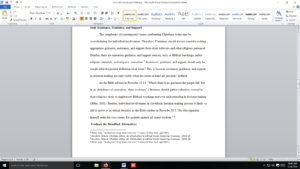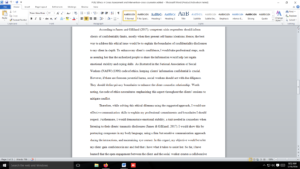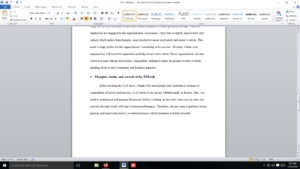Ethical leadership
Research paper on an ethical leadership topic. Must be at least 3000 words, not counting tables, figures, and (optional) Appendix. Cite at least ten books, journal articles, online sources, and miscellaneous material. Very strictly follow the APA Publication Manual format. Follow instructions under the Format for Term Papers under Modules. Be sure to APPLY, not just mention, relevant theories or models from the course.
1.) APPLICATION of the ethical and leadership theories and models from the course, and 2.) disciplined writing, closely following the APA style manual. Since the topic and focal leader are your choice, and since theme frame is the entire term, the grading will again be meticulous.
good topics emerge from press coverage of currents. Here are areas that my provide with some goooood ideas.
Some time back it was reported that world leaders were using the Mossack Fonseca law firm in Panama for offshore investment. There were immediate allegations of money laundering and tax avoidance/evasion. While the real meaning of all this is still not yet clear, the issue does suggest some good topics for papers. These issues are still very much with us today. Yes, sometimes the bad guys seem more interesting. It would be simple to select a leader(s) and write on possible corruption. This would make an easy, possibly exciting, but nevertheless garden variety paper. A much better approach – focusing on the underlying patterns and issues – would first examine what international dynamics put such large sums in leaders hands and gravitated toward Panama. The paper topics then would view what and how leadership (and of course leaders) could address the issue.
Some largely overlooked stories illustrate still another area of leadership, which exists in many fields, including the arts. Leadership may display a different manifestation in each field; it may demand a different style; it may be easier or harder to recognize. Movie and theater people – thespians, directors especially, plus producers, even agents and writers – may provide vivid examples of leadership in the arts. For example, the British actress, Dame Judy Dench, won a record number of Olivier Awards. Many music conductors are also natural examples. There are interesting examples even from the graphic arts: e.g., ironically, the phantom artist Banksy has been particularly influential. Some of you might find writing a paper on artistic leadership enjoyable.
The formal professions also provide examples of leadership. The legal/judicial professions certainly come to mind here. One interesting example is the influence of U.S. Supreme Court Justice Poesner, who passed away not long ago. While considered a conservative, Justice Poesner tended toward the pragmatic rather than the ideological. He was often surprising and controversial, with a style of influence worth study. He wrote several works, and his HOW JUDGES THINK is splendid reading.
Lastly, let me mention again that we are barely through the Centennial of the U.S. entry into the First World War. That conflict is arguably the greatest failure of leadership in the history of mankind. The seemingly omnipotent monarchs, ministers, and marshalls failed again and again to prevent the conflict. Their failures persisted throughout the duration of the war. The leaders of post war 1919 sewed further trouble that haunts us across the world today. Inept or weak leaders are also worthy of study.
The paper must include the materials in attach with detail as references.
The paper ask for at least 10 references.
here is a message from instructor and it might help
I’m still getting questions concerning selection of a term paper topic.
Let me throw out two general areas, both drawing a GREAT DEAL of
interest at this time. You should be able to formulate a very interesting
paper from either of these areas very nicely. Either one might be fruitfully
pursued with or without stress on a focal leader. These could be papers
of true excellence!
The first area deals with the focus of this course very directly: ethical
leadership and ethics in leadership. No one seems to doubt the important
linkages of leadership and ethics. However, in recent years some have
questioned whether the relationship is simple: perhaps the relationship is
like an inverted U, or haystack. That is, as formal emphasis on ethics increases,
above a certain level there may actually be decreases in performance or satisfaction.
These suggestions relate to increased stress or limited attention, not to the desirability
of ethics per se. Is there some truth to this assertion? Would it be true for all ethical areas? Are there remedies?
Second, as the textbook clearly states, leadership involves two way influences. The
influence of follower(s) upon leaders has been neglected in research. It is now getting greater
attention. What are these reciprocal influences? Just HOW do they involve ethics? What might moderate these
influence linkages?
While I am delighted that many of you are off to a good start on your term papers,
I am a little concerned that some of you seem to be delaying the choice of a topic.
Here are some other ideas.
Most students will (eventually) probably follow the suggested line of reasoning:
find a particular topic and/or leader as focus, and then diligently apply the relevant
concepts and theory pertaining to leadership and to ethics. This is fine – the expected
route. Many good papers should come from this approach. Yet it is not the only approach.
One might also look at a prominent and perplexing issue and examine it in light of the
relevant concepts and theories. E.g., what would leadership be like in the national opioid
crisis? Which specific institutions (public or private) might provide the leaders or leadership?
Will effective leadership in this crisis require some particular style? Or some particular
ethical approach? Does the very labeling itself (by press, government, and the AMA) of the issue
as a “crisis” change the situation regarding effective leadership? The same sort of questions might apply to a myriad of issues.
The list of relevant questions could go on and on. The list of perplexing issues to analyze is also
quite long. Such a perplexing issue may be very local as well – even in your own organization.
Use some creative thought.
Let me give you a link here from today’s WALL STREET JOURNAL – just to whet your thought!
Leadership in our IT rich age requires some behaviors and skills. While technology itself is
likely not often the critical factor, the interaction of people (individuals and teams) with technologies
can be a source of serious competitive advantage. Where and how does leadership play into this?
That is what the link is about: http://partners.wsj.com/
IBM, as well as many other companies, universities, and think tanks have also explored these issues in depth.
You must apply the relevant concepts and theory form the course, and these are mostly contemporary and derived from study of conventional Western institutions and people.
However, let me reiterate also the value of papers that use this material to study leadership in unconventional institutions or situations: Indian tribes, mobsters, isolated communities, proactive countertrade and the great “invisible banks” of Asia. If our cherished theory breaks down in this effort, simply note that and interpret it; that itself is a contribution. Also, of course, a focal leader for your paper need not be a “good guy.”
Finally, while you must use modern theory for analysis, you can try if you dare to apply it to historical leaders and situations. Such applications are not easy, but they are often very interesting and instructive. The possibilities are limitless. For example, as the French Revolution came to an end, a military force lead by Napoleon and his lieutenants essentially seized power, abolishing the authority of both the executive Directory and the parliamentary bodies of France in a military coup. The real genius behind the coup, however, was that old perpetual survivor, Talleyrand. Both Napoleon and Talleyrand would make good focal leaders.
For those with some interest in the way American industry and society developed, the traditionally celebrated leaders make good choices: the duPont’s, Vanderbilt, Carnegie, Rockefeller, and Ford were arguably not only the richest men of their day, but the most influential leaders. Although not extraordinarily wealthy, J. P. Morgan was perhaps the most powerful and influential leader of them all. Why are power and leadership so seldom discussed together? Why are there no women on this list? Just who were the extraordinarily influential women in that day? Yes! They were there. They were always there.
One last thought. Skepticism is often healthy. If you can’t be skeptical in grad school, when can you do it? Some have suggested that leadership cannot really be developed, that it is a romantic (but sometimes useful) idea, an attribution, or even that our understanding of leadership has NOT improved over the last three thousand years. Dig into these ideas and you will find yourself in good company – with names like Simon, Drucker, Meindl, Weick. (If you dug far enough you might even find Mankelwicz somewhere in the pack.)
Answer preview
whether to pay attention to the employees or shareholders, depending on circumstances.
Public leadership is perhaps more critical, with a conflicting view to focus on happiness or wealth creation. Posner (1979) explains that in a society where there is an emphasis on the generation of wealth over prioritizing citizens’ happiness, a more practical ethical focus is established. In this case, there is the integration of rights, happiness, and sharing with the less fortunate as a superior foundation for ethics. Some people can consider this view as ethically ridiculous, but there is a significant application, and for Richard Allen Posner, the combination is ethically attractive (Posner, 1979). During the 1980s, a period described as the resurgence of conservatism, and the ethical view was most common (Kinder, & Kalmoe, 2017). Allen Posner was an important public figure in the US as justice in the Supreme Court with key leaders in the legal issues. He was oriented to a pragmatic view rather than an ideological view, including in ethics. This research paper explains the relationship between leadership and ethics from a pragmatic view of Allan Posner. Wealth maximization, a popular leadership and ethics concept promoted by Allan Posner, is described aggressively as having ethical attractiveness.
[3246 Words]
Ethics and Leadership

